Spring 2019 CUS/ACRL-NJ Newsletter

From the President
By Bonnie Lafazan

Spring is finally in the air! With winter past us, so was another successful annual VALE Conference (our 20th!) ! Once again, we thank all of the conference organizers, volunteers, speakers and poster presenters Without each of you, the conference would not have been a success. Conference Co-chairs Amanda Piekart and incoming NJLA-CUS/ACRL-NJ President Cara Berg have already begun to work with the VALE Executive Board in planning next year’s conference. Stay tuned for an exciting change to VALE 2020!
 In April it was amazing to see so many of our New Jersey academic librarians at ACRL 2019 in Cleveland. Some sat on the same row as me on our flight going, one librarian I spotted jogging downtown and others presented poster sessions, roundtables and panel sessions. Our chapter should be so very proud of our representation of our NJ college and research libraries and our commitment to our ACRL national organization. There is much to learn from others around the country, but here too, so many of our own NJ librarians are cutting edge in their research, instruction and implementation of services in response to the changing roles of the higher education landscape.
In April it was amazing to see so many of our New Jersey academic librarians at ACRL 2019 in Cleveland. Some sat on the same row as me on our flight going, one librarian I spotted jogging downtown and others presented poster sessions, roundtables and panel sessions. Our chapter should be so very proud of our representation of our NJ college and research libraries and our commitment to our ACRL national organization. There is much to learn from others around the country, but here too, so many of our own NJ librarians are cutting edge in their research, instruction and implementation of services in response to the changing roles of the higher education landscape.
Next month, we look forward to seeing you at the NJLA Conference in Atlantic City! We will host Joyce Valenza who will speak at our CUS Luncheon on Friday, May 31st. We also look forward to presenting the Distinguished Service Award, Research Award, Technical Services Award and Technology Innovation Award. Please be sure to stop by our NJLA-CUS/ACRL-NJ table and say hello to us.
Finally, thank you for the opportunity to serve as President this year. I have learned so much about the passion and unique experiences of NJ’s academic librarians. While our institutions many be different, many of our challenges are the same in our distinctive role in serving our students. We must continue to engage and inspire each other professionally outside of our libraries so that we can bring those experiences back to our institutions. With that, I hope all of you will continue to fight for the value of our profession and all libraries, whether it be at our colleges, in our communities and in our schools.
Bonnie Lafazan is the NJLA CUS/NJ ACRL Chapter President. She is also the Library Director of Berkeley College's Woodbridge Campus Library.
2019 NJLA CUS / ACRL-NJ Distinguished Service Award
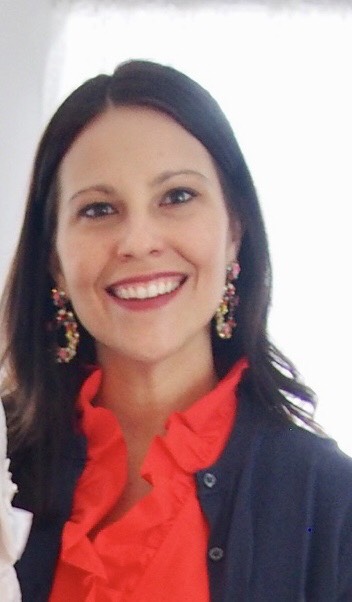 Adriana Mamay, Reference and Instruction Librarian at Middlesex County College, is the recipient of the 2019 Distinguished Service Award, granted by the New Jersey Library Association’s College and University Section/Association of College and Research Libraries New Jersey chapter (NJLA-CUS/ACRL-NJ). This honor is awarded annually to an individual who, by his or her outstanding contributions, has directly enriched the profession of librarianship in New Jersey. This award honors Adriana’s leadership on behalf of libraries, librarians and the library profession in New Jersey.
Adriana Mamay, Reference and Instruction Librarian at Middlesex County College, is the recipient of the 2019 Distinguished Service Award, granted by the New Jersey Library Association’s College and University Section/Association of College and Research Libraries New Jersey chapter (NJLA-CUS/ACRL-NJ). This honor is awarded annually to an individual who, by his or her outstanding contributions, has directly enriched the profession of librarianship in New Jersey. This award honors Adriana’s leadership on behalf of libraries, librarians and the library profession in New Jersey.
Adriana has served on the ACRL-NJ/NJLA CUS Executive Board for several years now, first as the Legislative Representative, and currently as the Honors and Awards Liaison. As the Legislative Representative, Adriana provided constant updates to the Executive Board about important library issues happening at the state and national level and worked on advocacy projects. During this time, she also worked on the NJLA Conference planning committee.
Adriana is currently a chair of the NJLA Conference Planning Committee. She has served in a leadership position on the committee for 3 years: first as vice-chair and the last two years as co-chair. Adriana sees the NJLA Conference as a vital part of New Jersey academic librarianship and has made it her mission to demonstrate to academic librarians the benefit of attending NJLA. She provided frequent communication to the Executive Board about the conference and works to create programming for academic librarians and encourage them to attend as well as present their own work. Adriana closely listens to her colleagues’ feedback about the conference and implements changes based on feedback. A conference chair echoed this, stating Adriana has a true willingness to connect groups and sees the value in all librarians – and library school students- collaborating together. She has worked to broaden the appeal of NJLA.
In 2017, the position of Awards Liaison was created in the ACRL-NJ/NJLA CUS Executive Board, which proved to be a natural fit for Adriana. Adriana successfully changed the format of the ACRL-NJ/NJLA CUS awards, incorporating them into the larger NJLA Honors and Awards Ceremony, as opposed to just during the CUS Luncheon. This encouraged academic librarians to attend the Honors and Awards Ceremony, and made it a more collaborative event. In addition, she collaborates with her colleagues in soliciting nominations and promoting the awards, and has solicited feedback to create new awards to honor her colleagues.
Adriana displays that same dedication as the Reference and Instruction Librarian at Middlesex County College. Her responsibilities include information literacy scheduling and instruction, one-on-one reference scheduling, reference desk service, coordinating the MCC Archives, and setting up themed displays. Just as she does in NJLA, Adriana looks to collaborate outside of the library and in the greater MCC community as she serves on the Executive Board of the Center for the Enrichment of Learning and Teaching (CELT) and has worked directly with faculty in incorporating information literacy assignments into their syllabi.
The New Jersey academic library community is lucky to have Adriana. I hope every academic library community has someone like Adriana- someone always looking out for the best interest of librarians and looking to collaborate with each other.
Congratulations to Adriana!
2019 NJLA CUS / ACRL-NJ Research Award Winner and Research Forum Selection
 Congratulations to Lisa DeLuca, MLIS, MPA, Social Sciences Librarian/Assistant Professor at the Seton Hall University Libraries. The NJLA CUS/ACRL-NJ Research Committee has selected her as the recipient of the 2019 NJLA CUS/ACRL-NJ Research Award for her publication, “Digital Resources to Support Quantitative Scholarship in Presidential Studies” in Presidential Studies Quarterly (PSQ) in September 2018 with Chairperson of the Political Science Department at Seton Hall University, Rob Palitto, PhD. PSQ is a top journal in its field and it’s rare for a librarian to be published with articles written by Presidential Scholars.
Congratulations to Lisa DeLuca, MLIS, MPA, Social Sciences Librarian/Assistant Professor at the Seton Hall University Libraries. The NJLA CUS/ACRL-NJ Research Committee has selected her as the recipient of the 2019 NJLA CUS/ACRL-NJ Research Award for her publication, “Digital Resources to Support Quantitative Scholarship in Presidential Studies” in Presidential Studies Quarterly (PSQ) in September 2018 with Chairperson of the Political Science Department at Seton Hall University, Rob Palitto, PhD. PSQ is a top journal in its field and it’s rare for a librarian to be published with articles written by Presidential Scholars.
Professor DeLuca will be honored at the NJLA Conference at the Awards Ceremony on Thursday, May 30th from 6:00 - 8:00 p.m. and again during the College and University Section Luncheon on Friday, May 31st from 12:30 - 2:00 p.m.
Congratulations also to Erin Ackerman, Social Sciences Librarian, The College of New Jersey; Jennifer Hunter, Reference and Research Services Librarian, Princeton University; and Zara Wilkinson (pictured), Reference and Instruction Librarian, Rutgers University-Camden. The Research Committee has selected their article “The Availability and Effectiveness of Research Supports for Early Career Academic Librarians” in the Journal of Academic Librarianship in September of 2018 as our Research Forum selection. This article identifies the strategies and supports that contribute to the research success of early career librarians, particularly those required to conduct and publish scholarly research in order to achieve tenure and/or promotion. Its focus on developing librarians' research skills and confidence aligns well with the mission of the Research Committee.
The Research Committee will host a Research Forum at the NJLA Conference on Thursday, May 30th from 4:10 -5:00 p.m. in the Wildwood 14 & 15 rooms of the Harrah's Convention Center in Atlantic City, NJ. Susan Bucks of Monmouth University will moderate the session in which both articles are presented.
Ackerman, E., Hunter, J., & Wilkinson, Z. T. (2018). The Availability and Effectiveness of Research Supports for Early Career Academic Librarians. The Journal of Academic Librarianship, 44(5), 553-568.
DeLuca, L. and Pallitto, R. (2018). Digital Resources to Support Quantitative Scholarship in Presidential Studies. Presidential Studies Quarterly. https://doi.org/10.1111/psq.12474
2019 NJLA CUS/ACRL-NJ Technical Services Award
 Dr. Yuji Tosaka, Cataloging and Metadata librarian from the College of New Jersey has been selected as a winner to be this year’s recipient of the NJLA CUS/ACRL-NJ Technical Services Award.
Dr. Yuji Tosaka, Cataloging and Metadata librarian from the College of New Jersey has been selected as a winner to be this year’s recipient of the NJLA CUS/ACRL-NJ Technical Services Award.
Dr. Tosaka has provided leadership and great service to the field of Cataloging/Bibliographic Control through regional, state, and national organizations. He has been actively involved with the NJLA CUS/ACRL NJ Bibliographic Control and Metadata Committee and made significant contributions to this committee via keeping the members up-to-date for the constantly changing cataloging standards and practices. His outstanding contributions have included conducting various workshops and training sessions to the other librarians in the region, such as a two-day RDA workshop, RDA NACO workshop, and RDA Toolkit Redesign workshop. He was also invited by the NJLA Technical Services Section to provide training on cataloging DVDs in RDA for cataloging and technical services librarians.
Dr. Tosaka has also been very active in professional service at the national level, serving on multiple ALCTS committees, most recently the ALCTS Standards Committee, which is charged with collecting and sharing information regarding current and developing standards. As an experienced NACO cataloger, he has also served nationally as a reviewer for new NACO institutions, and recently provided training on creating name authority records for cataloging librarians participating in the NACO New Jersey/New York Funnel program.
Dr. Tosaka has made significant contributions to professional literature on topics ranging from continuing professional education to evolving cataloging standards. His articles have been published in Library Resources & Technical Services, Cataloging & Classification Quarterly, College & Research Libraries, and the Journal of the American Society for Information Science and Technology.
Dr. Tosaka’s achievements in the profession also include his work as a co-PI in the IMLS-funded project, “Building a workforce of next generation librarians for 21st century global information access.” This four-year project was recipient of a half-million dollar grant under the Laura Bush 21st Century Librarian Program. The highlight of the project included the building of a self-sustaining digital repository for people to find and access professional development resources for self-directed lifelong learning in the cataloging and metadata field.
Dr. Yuji Tosaka truly deserves this Technical Services Award given his outstanding contributions to the profession of Cataloging/ Bibliographic Control and Metadata at local, regional, and national levels.
Announcements
Berkeley College
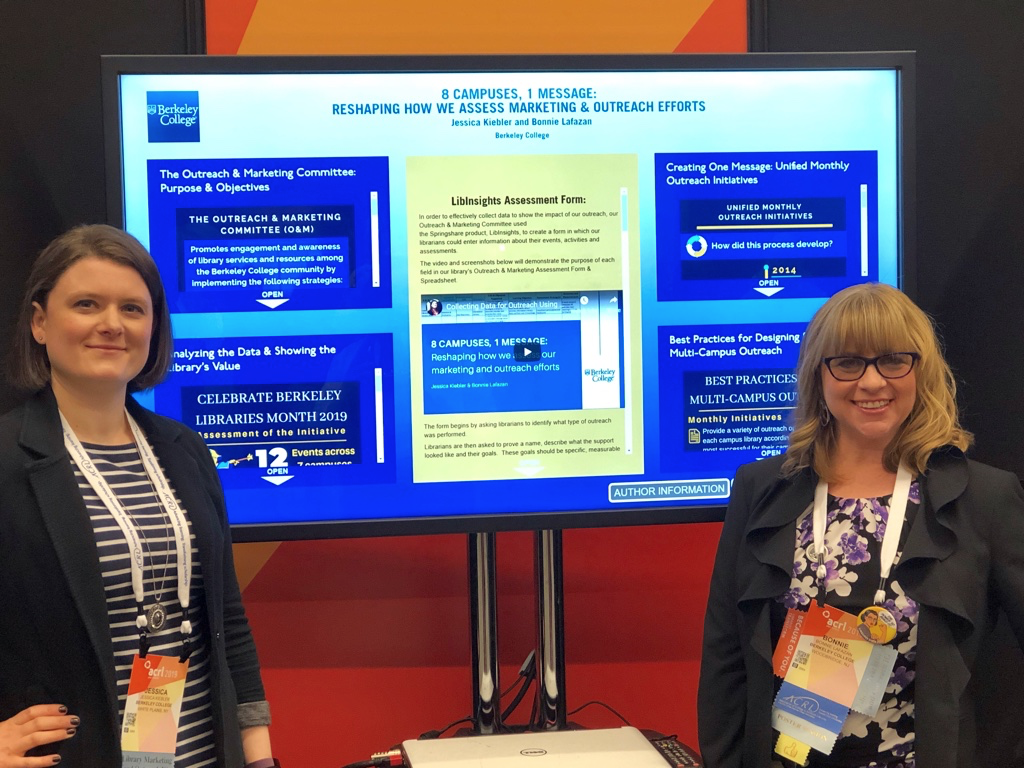
Librarians Jessica Kiebler (Director, White Plains) and Bonnie Lafazan (Director, Woodbridge) present "8 Campuses, 1 Message: Reshaping How We Assess Marketing & Outreach Efforts" at the ACRL 2019 Conference in Cleveland.
Hudson County Community College

Mei Xie, Technical Services Librarian, Lotta Sanchez, Library Technology Associate and Devlyn Courtier, Library Technology Associate co-presented "ILS Migrations" at Computers in Libraries 2019. Devlyn Courtier co-presented "Circulating Electronics" (photo above).
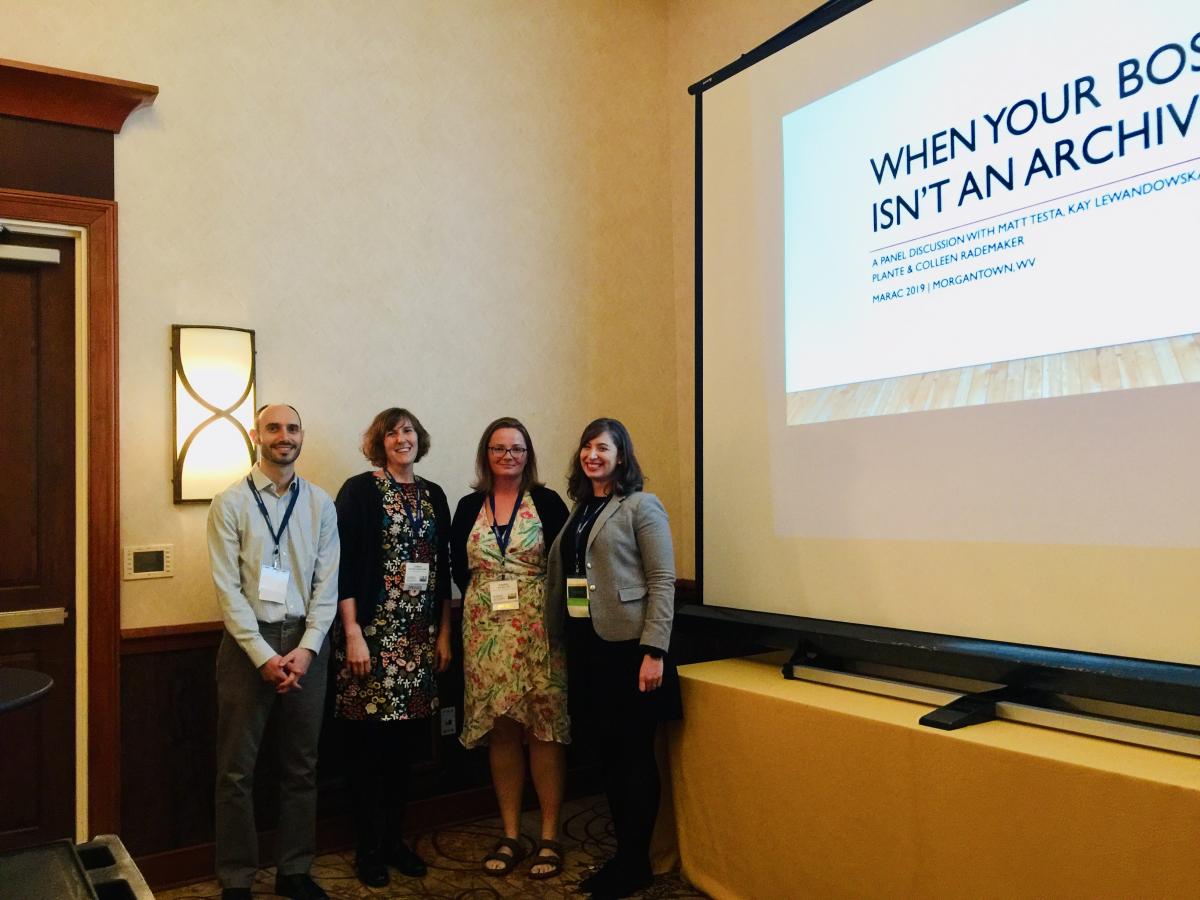
Alexandra Plante co-presented on a panel discussion "When Your Boss Isn't an Archivist" at MARAC 2019 (photo above).
New full time appointments:
James Cox, Librarian (October 2018)

Jennie Pu, Dean of College Libraries (Jan 2019) (pictured)
Amy Keavey, Librarian (March 2019)
Alexandra Plante, Librarian/College Archivist (April 2019)
Nouara Oubraham, Library Associate (April 2019)
Jing Yang has been appointed as the new Director of Library Technology (April 2019)
Ramapo College of New Jersey
Ramapo College's George T. Potter Library moved into a temporary space this semester as demolition begins on the old library building. We appreciate your patience as we ask for more interlibrary loans as a large portion of our print resources are temporarily in off-site storage. A new library building is scheduled to open in Fall 2021. Check here for updates and more information: https://www.ramapo.edu/learning-commons/
Seton Hall University
Lisa DeLuca, Social Sciences Librarian, and Robert M. Pallitto, Political Science Department Chair, published the article, "Digital Resources to Support Quantitative Scholarship in Presidential Studies" in Presidential Studies Quarterly (2018).
Lisa DeLuca and Katie Wissel, Business Librarian, published the article, "Learning to love data (week): Creating data services awareness on campus" in College & Research Libraries News (2018).
Marta Deyrup's book, A librarian’s guide to professional publication (ABC-CLIO/Libraries Unlimited), was published. For more information see https://www.abc-clio.com/ABC-CLIOCorporate/product.aspx?pc=A4752P .
The College of New Jersey
Erin Ackerman, Social Sciences Librarian, was recently elected Vice Chair/Chair-elect for ACRL's Politics, Policy, and International Relations Section (PPIRS).
William Paterson University
Cara Berg, Reference Librarian/Co-Coordinator of User Education, recently published the following article: Berg, C. (2018). No Assignment? Just Flip It: The Flipped Classroom in Library Instruction. College and Undergraduate Libraries, 25(4), 372-387.
Cara Berg and Nancy Weiner, Assistant Director, Access & Information Services; published the following article: Berg, C., Weiner, N. (2018). How are we doing? Using faculty feedback to assess the impact of library instruction on student work. Practical Academic Librarianship, 8(2), 13-28.
2019 NJLA-CUS/ACRL-NJ Technology Innovation Award
The winner of the Technology Award is the team from Murry and Leonie Guggenheim Memorial Library at Monmouth University for their project MAP IT Library Catalog Enhancement. The winning team was:
Sara Margaret Rizzo, Systems Librarian
Robert Carsey, Director of Server Operations
Janine Frederick, Systems Administrator
Allison Shields, Access Services Manager
Jing Zhou, Associate Professor, Department of Art & Design
MAP IT is a library catalog-based mapping application to show the approximate location of books in their collections. The result of this work is MAP IT, which now appears in their library catalog.
They will be presenting this project in detail at NJLA during the Technology Forum which is on Friday, May, 31st from 9:00 - 9:50 a.m.
VALE Updates
By Melissa Lena, VALE Program Manager
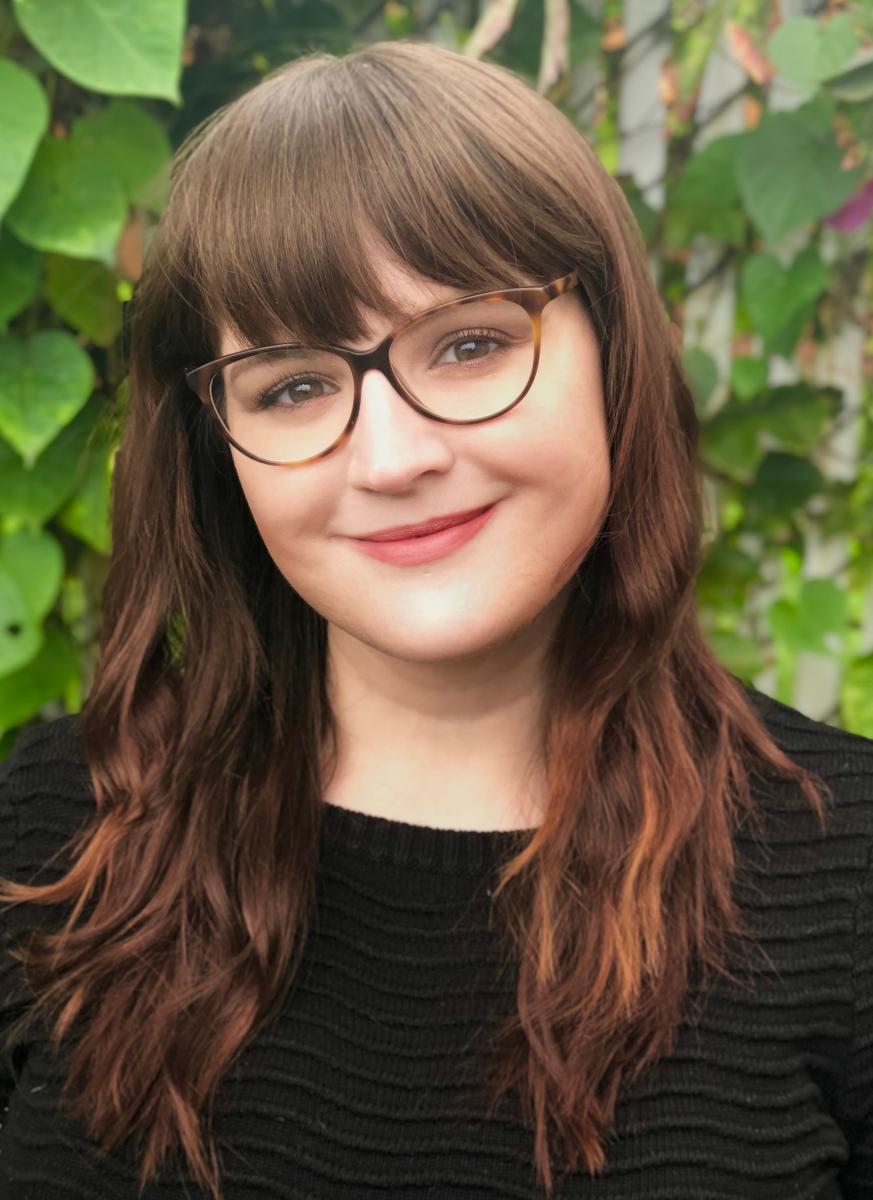
On March 25, the New Jersey legislature passed Bill S768, which requires institutions of higher education to develop an open textbook plan. After the bill is signed by the Governor, institutions will have 180 days to submit a plan to the Secretary of Higher Education to expand the use of open textbooks and commercial digital learning materials in order to achieve savings for students enrolled in the institution.
In the 2017-2018 academic year, the average student in NJ should have budgeted between $1k - $4k for textbooks and course materials. This money is in addition to the cost of tuition, which has far outpaced state funding, household incomes, and inflation. By adopting open educational resources, institutions not only remove financial barriers for all students, but also facilitate the free exchange of knowledge and give more control to faculty to innovate pedagogy. Studies have also shown that students using OER materials get significantly better academic results than those who do not.
VALE has prepared its members to meet this challenge through its Open Educational Resources (OER) initiative. Earlier this winter, VALE became a consortial member of the Open Textbook Network (OTN), whose Open Textbook Library is the premier online resource for textbooks that have been reviewed by higher education faculty for quality, and fully published for free use and distribution. The VALE-OTN partnership enables increased statewide coordination of open educational resources among VALE’s membership, provides students with free access to open textbooks, and enables collaboration between library executives, instructional designers, IT professionals, and other members of the higher education community to coordinate and execute successful OER programs. OER programs and partnership through the OTN enable a democratization of available educational material, driving down the cost of higher education for the individual student.
Benefits of this membership include two single day workshops presented by representatives from OTN, travel and accommodations for four elected Ambassadors to attend the Open Textbook Summer Institute at the University of Minnesota in Summer 2019; as well as access to workshop recruitment materials, OTN community of practice, and data collection support.
On February 28th and March 1st, VALE hosted the two daylong OTN workshops at Middlesex County College. The 125 attendees included academic librarians, faculty, instructional designers, IT professionals, and higher education administrators. The aim of these workshops was to increase participants’ familiarity with the nuances related to the issues around open textbook adoption, strengthen presentation capacity for future open textbook workshops, and enhance open textbook program development. The interactive learning environment of the workshop was designed to help attendees explore tools and resources for open textbook programming, identify strategies for addressing common challenges, recognize and address obstacles to open textbook adoptions, develop incentives for successful programs on their local campus, and share ideas with OER advocates and leaders from other NJ institutions.
On April 12th, VALE appointed 4 of its member institution’s librarians as VALE-OER Ambassadors. These ambassadors are Kenneth Karol (Passaic County Community College), Alison Cole (Felician University), Marilyn Ochoa (Middlesex County College), and Janet Marler (Ocean County College). The Ambassadors will attend the Open Textbook Summer Institute at the University of Minnesota in Summer 2019, where they will have the opportunity to collaborate with other open education leaders to develop open education strategies and build a community of practice. Upon their return, the Ambassadors will serve a one year term as leaders and mentors for OER adoption and open education practices across NJ institutions. They will support the work being done at the institutional level across VALE, and forge relationships among campuses for greater collaboration and cooperation around the state. The OER Ambassadors will also coordinate data collection from VALE institutions that will be communicated back to OTN and will provide VALE with data on OER adoptions throughout the consortium.
We want to continue the discussion about open educational resources and invite all interested to join us on the VALE-OER listserv: vale.oer@njedge.net. You can sign up for the listserv at https://vale.njedge.net/oer-listserv-signup/.
Data Love and Appreciation at the Hall
This article is reprinted with permission from the author from the Seton Hall Higher Education Graduate Student Blog: https://blogs.shu.edu/hegsa/data-love-and-appreciation-at-the-hall/
By Samah Alshrief
Love Data Week
Seton Hall recently showed a bit of love and appreciation to data through a series of workshops held in the common area of the Walsh Library. The workshops were part of Love Data Week and began on February 11th and ended on the 15th. All students, faculty and library patrons were welcome to take part.
The Love Data Week represents Seton Hall’s efforts to increase awareness of data within the community. Both national and international higher education institutions have placed similar campaigns in full swing with hopes of engaging a well-educated community in the many areas of data management.
Surprisingly, activities such as storing data, sharing data and reusing data are not well managed. According to Vicki Steeves, almost 80% percent of data collected in the 1990s is considered to be lost forever primarily because no one is able to locate it. It seems poor data management is to blame!
Accompanied by a couple of students from my department I took advantage of the opportunity to learn more about data management by attending the workshops offered at the Walsh Library.
On Monday and Tuesday, the Love Data Week started off with tours to educate participants about the Walsh and Msgr. William Noé Field Archives as well as the Special Collection Center. Tuesday’s tour and an event that I was excited to attend, the JSTOR Lab: Text Analyzer Data for Research were both canceled due to weather conditions (Lisa DeLuca will be working to reschedule the lab, so stay tuned!).
Wednesday was filled with fun and engaging sessions by Vicki Steeves and Sarah DeMott from the Data Services Team at the University of New York. Vicki walked us through some very useful tips on managing data and storing it in its proper format. She also shared many free resources for our benefit.
For more information, please visit Vicki Steeves’ page on the Open Science Framework (OSF) at https://osf.io/7mj2q/ .
We also learned that Vicki, Sarah and another colleague used Python to develop a free qualitative software named Taguette. They shared this software with us and gave us a chance to try it out. I found the software to be quite simple and user-friendly.
Taguette allows qualitative researchers to upload Markdown, PDF, HTML, DOCX files or e-books using mobi file. Users can also highlight quotes and tag them together in categories then export the tags or quotes in PDF, HTML or DOCX files. The highlight feature and the tags can be used deductively or inductively. The software also has a charming feature that allows users to backlight highlighted quotes and grey all text in the background.
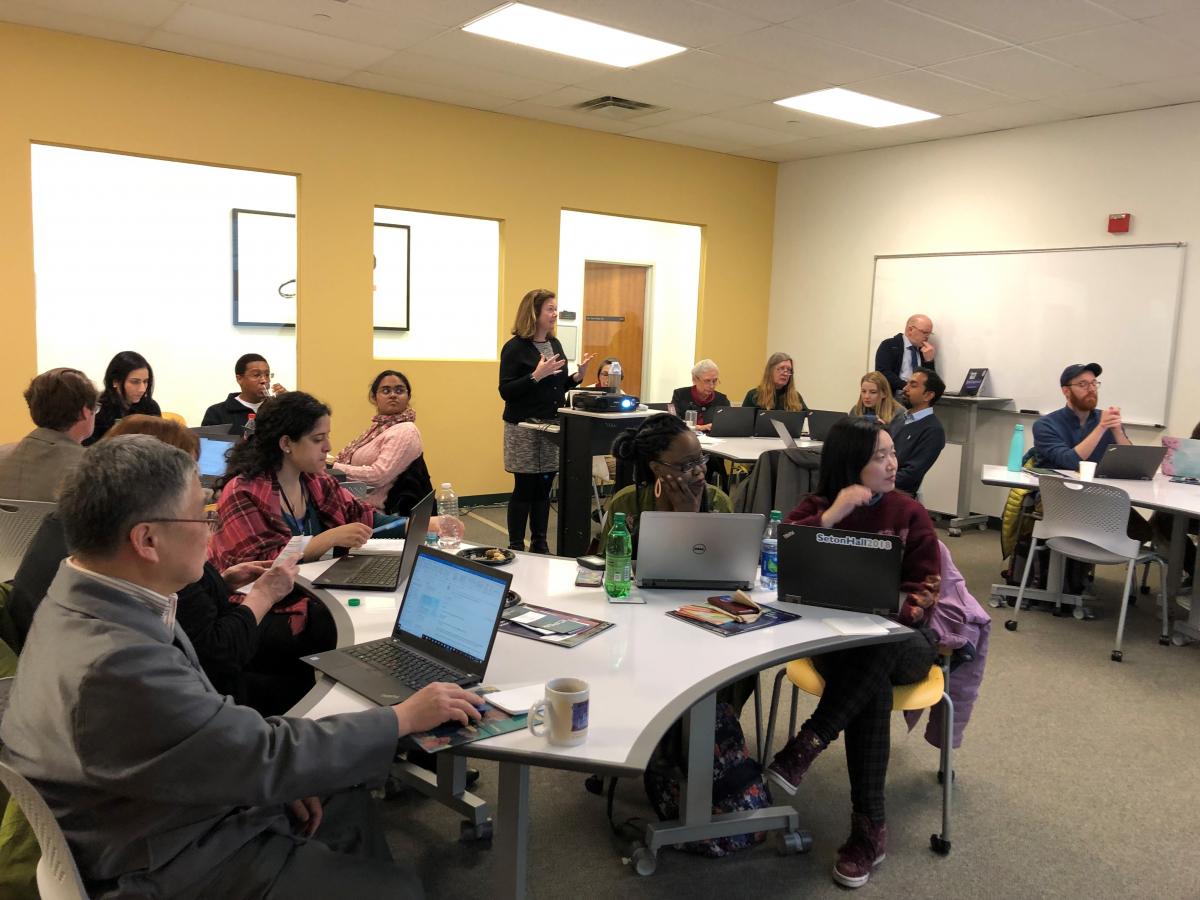
Overall, I found it to be a great free tool for managing data even if you’re not a qualitative researcher. For instance, it can help you highlight your literature and tag it in themes that you can then print. Anyone can download Taguette for free at https://www.taguette.com. Though a word of caution: if you are looking for a more sophisticated tool this may not be for you.
The last workshop held on Wednesday was Advanced Qualtrics, hosted by Sarah. She provided us with practical tips on using Qualtrics and walked us through the steps of designing a survey with the program. Anyone interested in this subject matter can attend future sessions offered by the Seton Hall Learning and Technology Center (TLTC). Some sessions for example offer lessons on how to create a survey from scratch using Qualtrics.
On Thursday, we attended a workshop presented by Katie Wissel on using Tableausoftware for data visualization. The workshop was pretty awesome, we learned all of the beginning steps to creating interactive visualization for data and ended up creating a beautiful interactive map of museums in the United States. I think Tableau is great and would recommend it to other students wanting to create powerful, attractive data presentations.
One notable feature of Tableau is that it actually provides you with recommendations regarding the most suitable visualizations for your data type. These recommendations are based on your numerical or categorical data measurements.
Overall, a wonderful program with a free basic version available to everyone (and a more advanced version available for purchase). Additionally, Seton Hall faculty have free access to the Tableau Prep version.
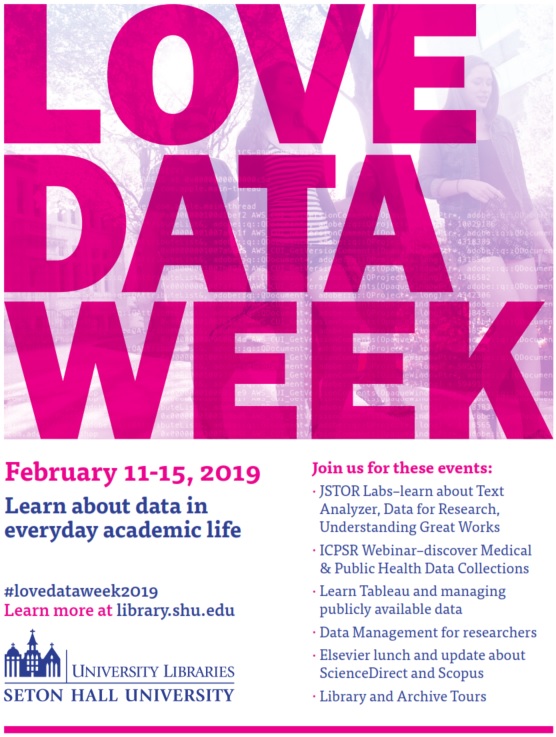 Finally, on Friday we met with Lana Wear a senior customer consultant at Elsevier. Lana presented three useful tools for researchers: Mendeley, ScienceDirect, and Scopus. We learned about their various data repositories and how to find data using different functions. All of the tools utilized advanced machine learning algorithms to enable users to track, analyze and visualize research including articles and even citations.
Finally, on Friday we met with Lana Wear a senior customer consultant at Elsevier. Lana presented three useful tools for researchers: Mendeley, ScienceDirect, and Scopus. We learned about their various data repositories and how to find data using different functions. All of the tools utilized advanced machine learning algorithms to enable users to track, analyze and visualize research including articles and even citations.
Users are able to track authors and their affiliations as well as publications and collaborations between authors and institutions. All of this and more is available through interactive visualizations. During this workshop we learned that the chemistry department has the largest collection of publications of all of the Seton Hall departments.
Conclusion
All in all, the librarians of Seton Hall did an exceptional job organizing and coordinating these awesome workshops for students and faculty. Lisa DeLuca and Sharon Ince were very warm and welcoming as always to all of the attendees. I highly recommend students to take advantage of the services offered by Seton Hall librarians which are available to aid them in achieving their research goals.
Gerry Shea also offers great services in the education department with all of the resources you could imagine for conducting research. Mike and I also intend to arrange future collaborations with this lovely staff in order to provide workshops for students in our department as well.
Berkeley College Librarians Celebrate the Magic of Libraries
By Maria Deptula, Jessica Kiebler, Bonnie Lafazan and Dina Meky
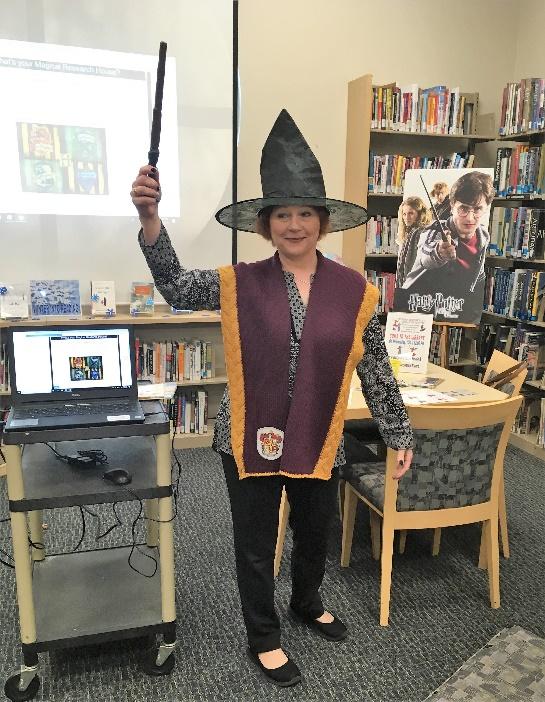 For a second year, Berkeley College Libraries observed January as their month to celebrate the value of the Library to student learning. In 2018, after years of skipping the observance of National Library Week because it fell during our recess, Berkeley College librarians decided to dedicate an entire month to the appreciation of our libraries and librarians. Last year’s theme focused on our librarians as Superheroes of Information. This January, we commemorated the 20th anniversary of the first Harry Potter book to highlight the Magic of Libraries and our Wizards of Research!
For a second year, Berkeley College Libraries observed January as their month to celebrate the value of the Library to student learning. In 2018, after years of skipping the observance of National Library Week because it fell during our recess, Berkeley College librarians decided to dedicate an entire month to the appreciation of our libraries and librarians. Last year’s theme focused on our librarians as Superheroes of Information. This January, we commemorated the 20th anniversary of the first Harry Potter book to highlight the Magic of Libraries and our Wizards of Research!
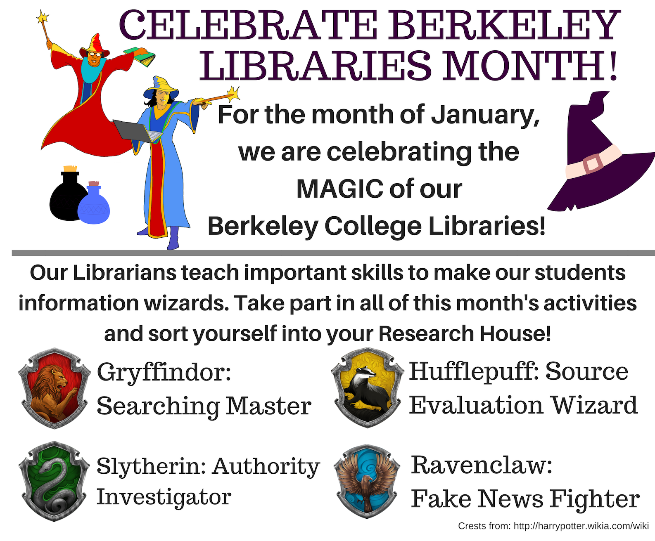 Our team of Harry Potter fan librarians prepared a LibGuide full of games, activities and of course, educational research information. Each week was focused around a different “Research House” as we aligned each Hogwarts House with an information literacy skill. Based on some of the characteristics of the beloved houses, Gryffindors became “Searching Masters”, Hufflepuffs were “Source Evaluation Wizards”, Ravenclaws were “Fake News Fighters” and Slytherins were “Authority Investigators.” We then encouraged all of our campus libraries to promote the festivities by challenging students and staff to take our research question-of-the-week or to take a house sorting quiz and join one of the Hogwarts magical houses. Faculty in several classes joined the fun and granted extra credit to students who tested their research skills on the weekly questions. In addition, with the help of the online quiz, “Factitious,” we also encouraged students to practice their fake news awareness.
Our team of Harry Potter fan librarians prepared a LibGuide full of games, activities and of course, educational research information. Each week was focused around a different “Research House” as we aligned each Hogwarts House with an information literacy skill. Based on some of the characteristics of the beloved houses, Gryffindors became “Searching Masters”, Hufflepuffs were “Source Evaluation Wizards”, Ravenclaws were “Fake News Fighters” and Slytherins were “Authority Investigators.” We then encouraged all of our campus libraries to promote the festivities by challenging students and staff to take our research question-of-the-week or to take a house sorting quiz and join one of the Hogwarts magical houses. Faculty in several classes joined the fun and granted extra credit to students who tested their research skills on the weekly questions. In addition, with the help of the online quiz, “Factitious,” we also encouraged students to practice their fake news awareness.
Another way we involved the campus community was by creating a Jeopardy game with categories such as Library Fun Facts, Information Literacy, Berkeley Libraries and of course, Harry Potter. Librarians partnered with professors to join a class session and “teach” students about the library using the interactive game. The game was very effective at one campus where students came to the library after one class to ask for more information on our new Flipster service after learning about it through Jeopardy! In addition, the links to each quiz were housed on our LibGuide making the month’s activities easily available to both on on-campus and Online students. With more fun activities on the LibGuide this year, there was a 218% increase in visits to the 2019 Magic of Libraries guide!
One of our libraries even invited a real magician who charmed the participants with magic tricks. The libraries were decorated with Harry Potter décor like wands, owls and Hogwarts backdrops with selfie props. A few librarians even wore robes! Librarians also took this opportunity to display our physical collection pertinent to Harry Potter and magic.
The Magic in Libraries Theme opened up the world of information literacy in a format that most students could have fun with. Even though some of our students were not familiar with the intimate details of J.K. Rowling’s epic tale, presenting the library through games, trivia, and giveaways helped teach information skills, promote our collection, and made the librarians more approachable and relatable.
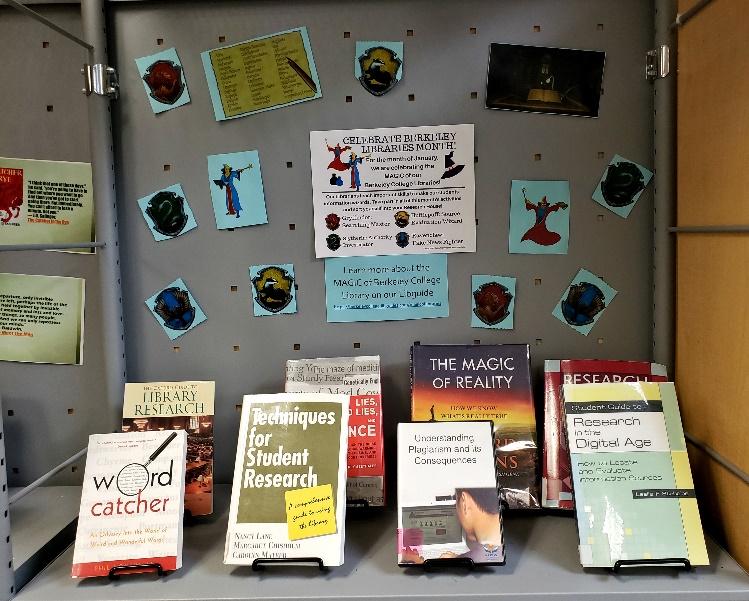
Maria Deptula is the Library Director, Berkeley College Paramus Campus Library and can be reached at mde@berkleleycollege.edu.
Jessica Kiebler is the Library Director, Berkeley College White Plains Campus Library and can be reached at jessica-kiebler@berkeleycollege.edu.
Bonnie Lafazan is the Library Director, Berkeley College Woodbridge Campus Library and can be reached at bonnie-lafazan@berkeleycollege.edu.
Dina Meky is a Reference and Instruction Librarian at Berkeley College Woodbridge Campus Library and can be reached at dina-meky@berkeleycollege.edu.
NJLA CUS / ACRL-NJ Programs and Sessions @ 2019 NJLA Conference

Meet the CUS Luncheon Speaker, Joyce Valenza!
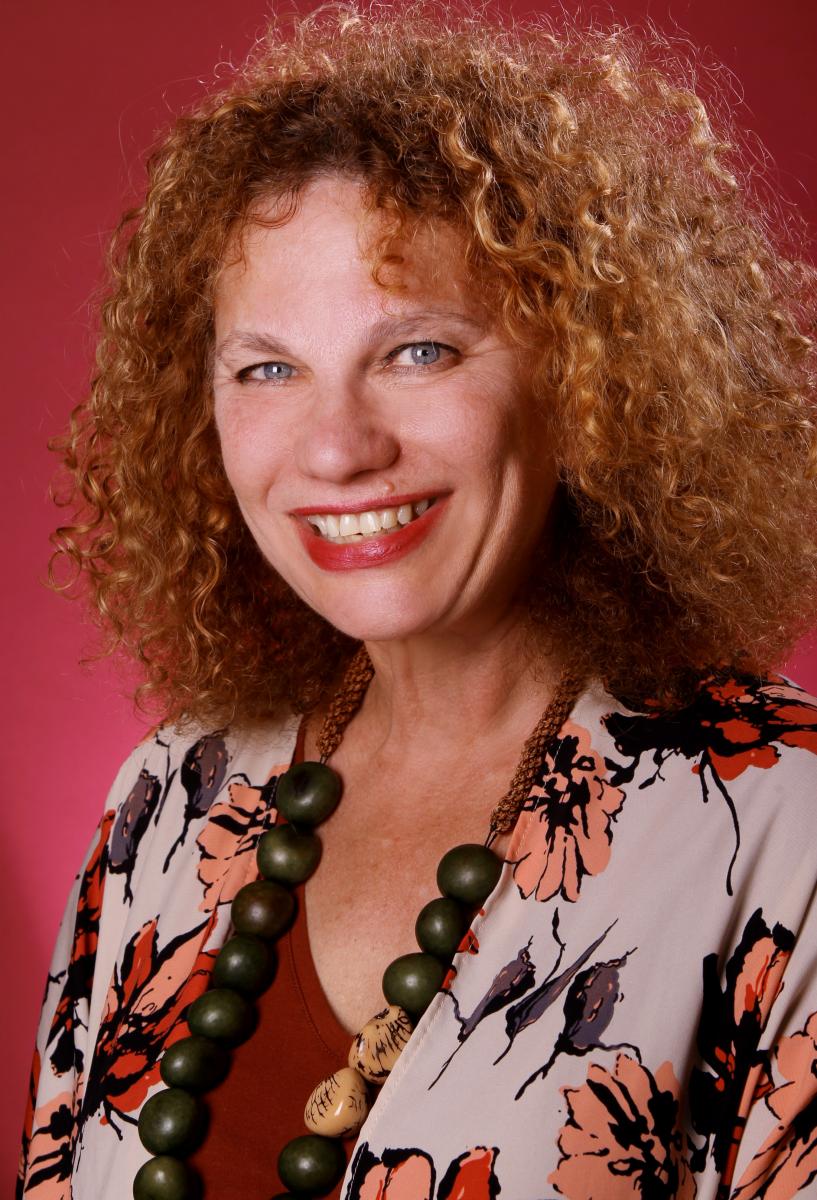 Visit the NJLA Conference blog to learn more about the CUS Luncheon speaker, Joyce Valenza. Joyce has been a librarian in a variety of settings for the last 40+ years, working in special, public, and school libraries!
Visit the NJLA Conference blog to learn more about the CUS Luncheon speaker, Joyce Valenza. Joyce has been a librarian in a variety of settings for the last 40+ years, working in special, public, and school libraries!
The CUS Luncheon will be on Friday, May 31st from 12:30 - 2:00 p.m. in Wildwood 3. The theme is "Let's Talk about the future of Library and Information Science Education," and tickets must be purchased in advance.
James Cox (HCCC) is this month's Member Spotlight
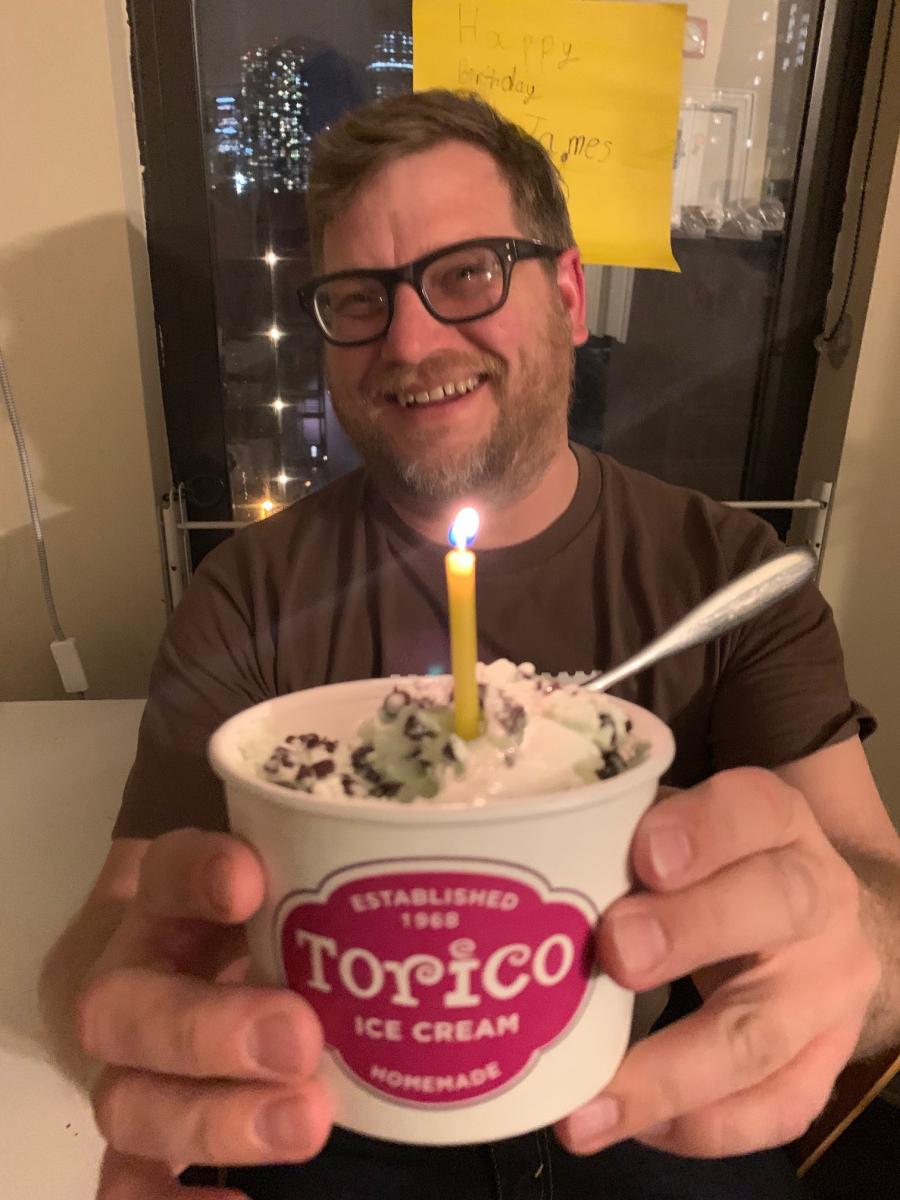 Be sure to read the Member Spotlight on the NJLA CUS / ACRL-NJ homepage to learn more about James Cox, a new librarian at Hudson County Community College!
Be sure to read the Member Spotlight on the NJLA CUS / ACRL-NJ homepage to learn more about James Cox, a new librarian at Hudson County Community College!
Learning to Teach with Primary Sources from the Library of Congress
By Michelle Kowalsky, Rowan University
We all know the types of resources which would be considered primary sources -- newspapers from the time period of a current event, such as the Civil War; diaries from those who traveled on ships to America as immigrant, contemporaneous to their travels; and maps drawn by early explorers, including George Washington, which can be surprisingly accurate at times. All of these and more primary digitized sources are available via the Library of Congress’ digital collections, available online and discoverable in three different ways:
https://www.loc.gov/collections/ - search for items or browse their featured collections
http://www.loc.gov/teachers/classroommaterials/ - find lessons for students organized by standard
A Google search of a topic of interest along with -- site:loc.gov -- in the search box
These materials are unique items, digitized in high resolution to provide zooming for close examination, and transcribed into text (especially useful for those who can no longer read handwriting!). The Library of Congress is of course just one of the many Washington DC-based institutions archiving our world heritage, and they definitely collect more than just books. Some using the Library’s website may give up too early in their search, since the interfaces may not seem intuitive. As a result, the Library has provided training to help educators learn how to navigate the many collections, and then to teach others how to do the same. In order to scale up their efforts, the Library has awarded regional grants to those who can assist in this training effort.
Dr. Michelle Kowalsky of Rowan University, Glassboro, NJ, and Dr. Michael LaMagna of Delaware County Community College, Media, PA have received a $40,000 grant from the Library of Congress for their regional training workshops about this very topic. As part of the Library of Congress' Teaching with Primary Sources Program, administered in the Eastern region by Waynesburg University, the two librarians will help K-12 teachers in the Delaware Valley to use the Library's digitized primary sources to engage students, develop their critical thinking skills, and construct knowledge.
Specifically, teachers will collaborate to uncover new resources in the Library of Congress database, and to select items which might serve as significant curricular connections as well as shorter lesson prompts. Community college and university professors, teacher preparation faculty and mentors, humanities liaison librarians, K-12 teachers, pre-service candidates and others will document integration of primary sources for lessons in history, social studies reading, literature, art, foreign language, and digital media courses, among other subjects. Via a train-the-trainer program, online professional development modules, and an annual poster conference, participants will share their ideas and teach others about new primary source materials and strategies.
The duo have just started holding information sessions in NJ and PA for K-12 teachers who are interested in taking the online tutorial and learning about the primary sources that are available from the Library of Congress. The grant will pay teachers $100 to complete the online training (and in addition, provide a Professional Development certificate for 12 hours!), and $300 to complete a second online course to become a Primary Sources trainer and hold teacher workshops of their own. Please help advertise this initiative as you are able -- between 300 and 400 teachers in our area can take the online training, and receive the honorarium, over the next year! (First come, first serve of course -- we are starting with South Jersey and Southeastern Pennsylvania). Questions about the required in-person orientation workshop and the subsequent online training can be sent to Michelle Kowalsky, Rowan University, kowalsky@rowan.edu.
From the Newsletter Archives
 In Spring 1999, the College and University Section was looking back on 50 years of its existence. Look for some familiar names in "Focus on People" and reminisce with them at the upcoming NJLA conference. Conference and meeting topics in the 1999 newsletter are still our concerns today: mostly technology and the dynamic role of librarians in higher education. At the Spring 1999 NJLA conference, the CUS/ACRL-NJ luncheon speakers discussed "The Role of the Library in Supporting New Technology." Enjoy the issue!
In Spring 1999, the College and University Section was looking back on 50 years of its existence. Look for some familiar names in "Focus on People" and reminisce with them at the upcoming NJLA conference. Conference and meeting topics in the 1999 newsletter are still our concerns today: mostly technology and the dynamic role of librarians in higher education. At the Spring 1999 NJLA conference, the CUS/ACRL-NJ luncheon speakers discussed "The Role of the Library in Supporting New Technology." Enjoy the issue!
Batman and Robin “High Five” duo in on-site instruction?
Librarians team together in on-site instruction in five beneficial ways
By Jaclyn De Nichilo, MSLIS & Susan Van Alstyne MLIS
When professors request librarians for on-site instruction, it provides a large window of opportunity to connect with students and allows librarians to emphasize the importance of quality research and library resources. Most importantly, the fact that professors are seeking librarian assistance in classes indicates that we are valued and seen as an asset to student academic success. In preparing for on-site instruction for any subject, there is an advantage if we visited the course before and are aware of the subject matter and if not, we must have a foundation of the subject before providing in- class instruction. In those instances when we are unsure of the subject matter, and at times a request can be at the last minute to visit a course, we seek a positive lending hand from our library colleagues. At the start of fall 2018, a Library Director and Research and Instruction Librarian from Berkeley College in Woodland Park, NJ started to co-teach with on-site instruction in multiple courses. In what started to help each other has developed in ways we could have never imagined. The “Batman and Robin” duo has been a huge success and proven beneficial in five ways.
Firstly, it would be ideal if each librarian knew everything about a subject, but that’s simply not the case! It is essential that all librarians have a consistent level of understanding of all subject content. By co-teaching with a librarian that is knowledgeable on a subject matter, it provides a great learning opportunity for the other librarian to have that “teachable” moment while preparing material for the class or during the instruction sessions. Moreover, speaking from our experience, it builds confidence in providing instruction on a solo basis. Co-teaching would also help in assisting a student that approached the reference desk because of that library instruction session. The knowledge sharing benefits are twofold—growth for the librarians as well as better service for the students overall. Students would be assisted at the time of need instead of waiting for the “subject expert” librarian.
Co-teaching is beneficial in that you observe the teaching style of your colleague and can adapt their style to your teaching approach. It is crucial to be cognizant of how we are connecting with students in the classroom with our instruction style. Although this can be challenging, librarians must put their best effort forward in any way adapt to various assignments, different learners, while being effective instructors to ensure students are achieving the learning outcomes of the instruction session. Having two librarians provide instruction in an on-site course allows instruction to more engaging and will prompt more student interaction. Often, a librarian may be working with a professor for the first time as is the case with some adjunct professors in addition to meeting the students for the very first time. Librarians are venturing into uncharted territory, and this may even unnerve the most seasoned instruction librarian. Having the support from a colleague leads to a more productive outcome and as we were surprised an interactive session.
The presence of two librarians in a course demonstrates collaboration at its best where library staff as whole works together to assist students in reaching academic success. By having a dual librarian presence in class, it reassures togetherness, and by students observing a strong collaboration, they observe that student-librarian relationships can be formed. We demonstrate that we are working together as a team or work is “group-work” that many students bemoan. We will introduce ourselves and will briefly describe our goals for the session, and how we work as a team to ensure they will achieve the learning objectives of the session. Another benefit is that we save time with technology delays during the session. While one librarian is talking, the other is dealing with the technology—and this eases the apologies for awkward technology delays! Another benefit of co-teaching is that it provides the opportunity for faculty to become familiar with their campus librarians, library services, and understand our value. Simply, co-teaching leads to focused delivery of the library services, communication of our resources and overall illustrates the strength of the library as a cohesive unit. We have shared the depth of our resources to students and have been able to communicate the value of the research process. For example, we had students from a class come to the library from one course and are struggling to find resources, which at most times the reason being is that they are only using internet resources since they are unaware the library can support their research needs. By co-presenting in courses, this can build on student-librarian as well as faculty- librarian relationships. Faculty can contact librarians that visited their courses, knowing who they are now and can create learning opportunities such as librarians creating webinars on resources, being embedded into future online classes and creating LibGuides.
Lastly, co-teaching serves as a reflection on library collection development with physical and electronic resources. Do our libraries have the resources to support all subjects? Do our LibGuides reflect our library resources as opposed to promoting other libraries? With two librarians preparing for on-site instruction, we can see essentially what our libraries are lacking in terms of library resources and provide crucial feedback to upper library administration. In doing so, we are benefiting our library by raising our voices to strengthen our collections in the more courses we visit to support student research needs properly.
In conclusion, co-teaching in on-site instruction is beneficial as it allows teachable moments for a librarian to build confidence in a subject matter by learning from their colleague, provides the opportunity for adaption in instruction style, builds upon student relationships, contributes to future faculty collaboration in on-site and online instruction and makes us aware of the strength of collection development to support course research. Overall, co-teaching is nothing more than an absolute plus in relaying the message of the impact of library services and overall the value of librarians to student success!
Jaclyn De Nichilo is a Research and Instruction Librarian at Berkeley College's Woodland Park campus. She can be reached at Jaclyn-denichil@berkeleycollege.edu.
Susan Van Alstyne is the Library Director at Berkeley College's Woodland Park campus. She can be reached at sva@berkeleycollege.edu.
New Reading Room at Rowan University's Campbell Library
By Kathryn Croskey
Campbell Library is on the Glassboro Campus of Rowan University. During the winter break, work was completed on the main reading room that houses current print periodicals and Children & Young Adult Fiction. Students, faculty, and staff enjoy the refreshed space which features natural light and pleasant views of the campus.
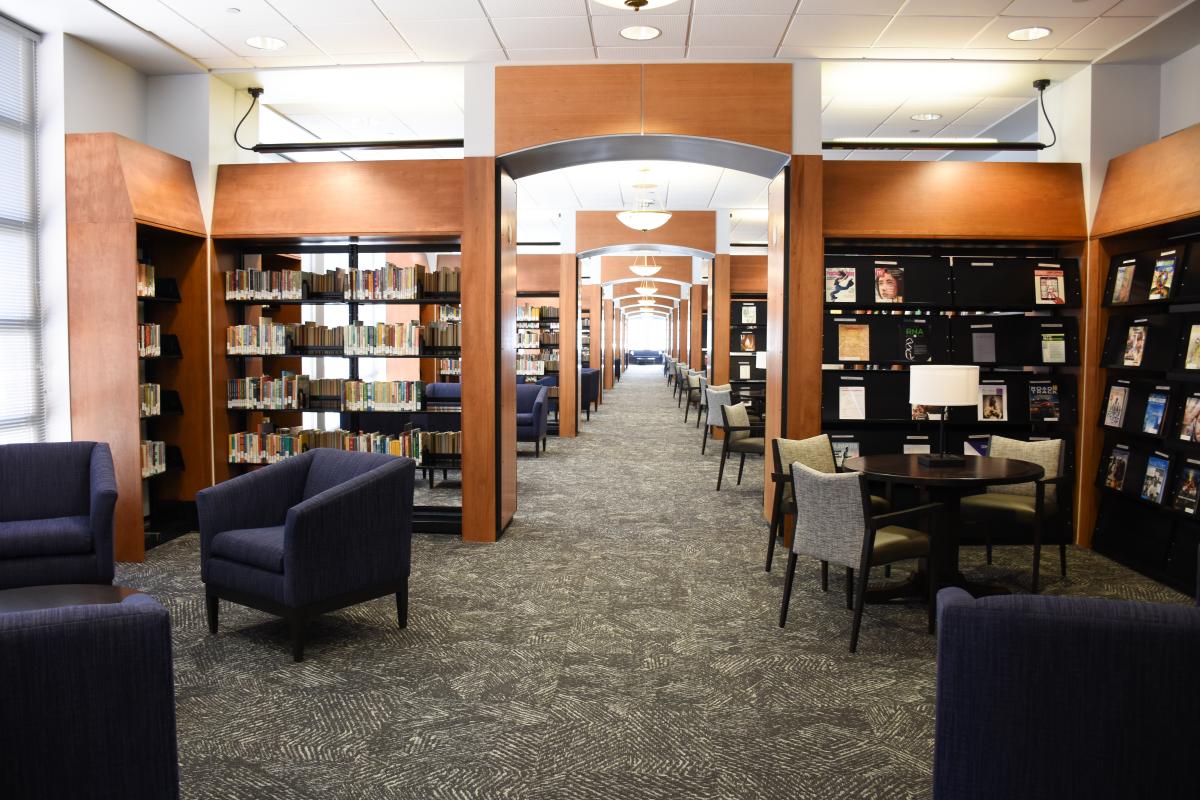 The project included fresh paint, new carpeting, and updated lighting. The main attractions, however, are the variety of attractive seating options. The design includes hard seating around tables with built-in lamps and USB chargers. Soft seating options are grouped around coffee tables. There are also barstools around a parson table.
The project included fresh paint, new carpeting, and updated lighting. The main attractions, however, are the variety of attractive seating options. The design includes hard seating around tables with built-in lamps and USB chargers. Soft seating options are grouped around coffee tables. There are also barstools around a parson table.
This is the latest in a series of projects to refresh and update student spaces throughout the library. Other recent initiatives include additional group study rooms, carrels for individual study, and a learning commons area featuring both hard and soft seating with rolling white boards. Students are invited to provide input on what should be included in any space. This feedback can come in the form of easels and post its, online forms, and participation in the library’s Student Advisory Council.
Student workers also have input. They have been asked:
- As a student, what do you need in this space?
- As a library staff member, what complaints or questions do you receive that this space can address?
- As a library staff member, what frustrations have you observed when students are in this space?
Library staff also participate in decision making. The task force for each project has included representatives from Reference, Instruction, Access Services, and Collection Management. Collaboration with campus IT and Facilities have been essential to the success of each project.
More and more research occurs online as we rely heavily on electronic databases and grow e-book collections. The role of the library building has changed as a result. These projects have kept pace with the way students now use the library as a physical place.
Kathryn Croskey is the Marketing & Outreach Coordinator for University Libraries at Rowan University. She can be reached at croskey@rowan.edu
Moving the Library to a Residence Hall
By Hilary Westgate
For the past several years, the librarians and staff of the George T. Potter Library at Ramapo College have been involved in planning for major library renovations for the years 2019-2021. (The project website with details and photos is here: https://www.ramapo.edu/learning-commons/) Our original library building will be undergoing such extensive demolition and renovations that we needed to move completely out of the building and relocate all resources, staff, and student space. Ramapo College found that they would be able to turn a residence hall on campus into a temporary library building for the years 2019-2021. The library staff and librarians were able to provide feedback for the renovation of the residence hall that would become our temporary space. For this move, approximately 75% of our print collection was moved into off-site storage, and 25% of the collection has stayed on campus. We converted many print journals to electronic subscriptions, and we shifted from a VHS collection to DVDs or streaming video.
Linden Hall was a first-year student residence hall on campus, but there was enough housing offered in other campus buildings that the College was able to turn Linden into the temporary Potter Library. We moved into our temporary space over January of 2019 and were able to open for the start of the Spring 2019 semester on January 22, 2019. The RCNJ Center for Reading and Writing and the Gross Center for Holocaust and Genocide Studies were in the original library building, and they were able to move with us to Linden Hall to provide uninterrupted services. We also have our own special collections of Archives and the American History Textbook Project. Suite-style dorms were turned into offices, many study rooms of various sizes, conference rooms and meeting rooms, rooms for book collections and audiovisual materials, printing rooms, and staff spaces. The renovations were done in such a way that there are no remaining traces of residence hall rooms; it would be difficult to tell except for the long hallways and the old mailboxes! The first-floor lounge was turned into a beautiful computer lab/classroom for information literacy classes. We also were able to have a second computer lab on the second floor, and we have new printers throughout the building with wireless printing. Though we are in a smaller space, we have been able to maintain many of our key resources and services. Students seem to love the increase in study rooms -- we have large, medium, and small study rooms in Linden Hall -- and they are frequently in use.
We had to make efforts to inform the campus community of our move, including sending out campus announcements and emails, offering tours of the new space -- both for groups and individuals --, hosting an Open House, sharing the information with the Student Government Association and the Center for Student Involvement, highlighting the move on social media, asking our Marketing office to create print materials, creating and updating a website, updating the library’s main website, offering events, and more. We believe that we have effectively informed much of the College community, and though our temporary building is a bit farther from the center of campus than we used to be, we feel we can be a wonderful library for our students, faculty, and staff in our temporary space until our original building is fully transformed. See our website for more details, especially the Temporary Library Space page and the Photo Gallery: https://www.ramapo.edu/learning-commons/

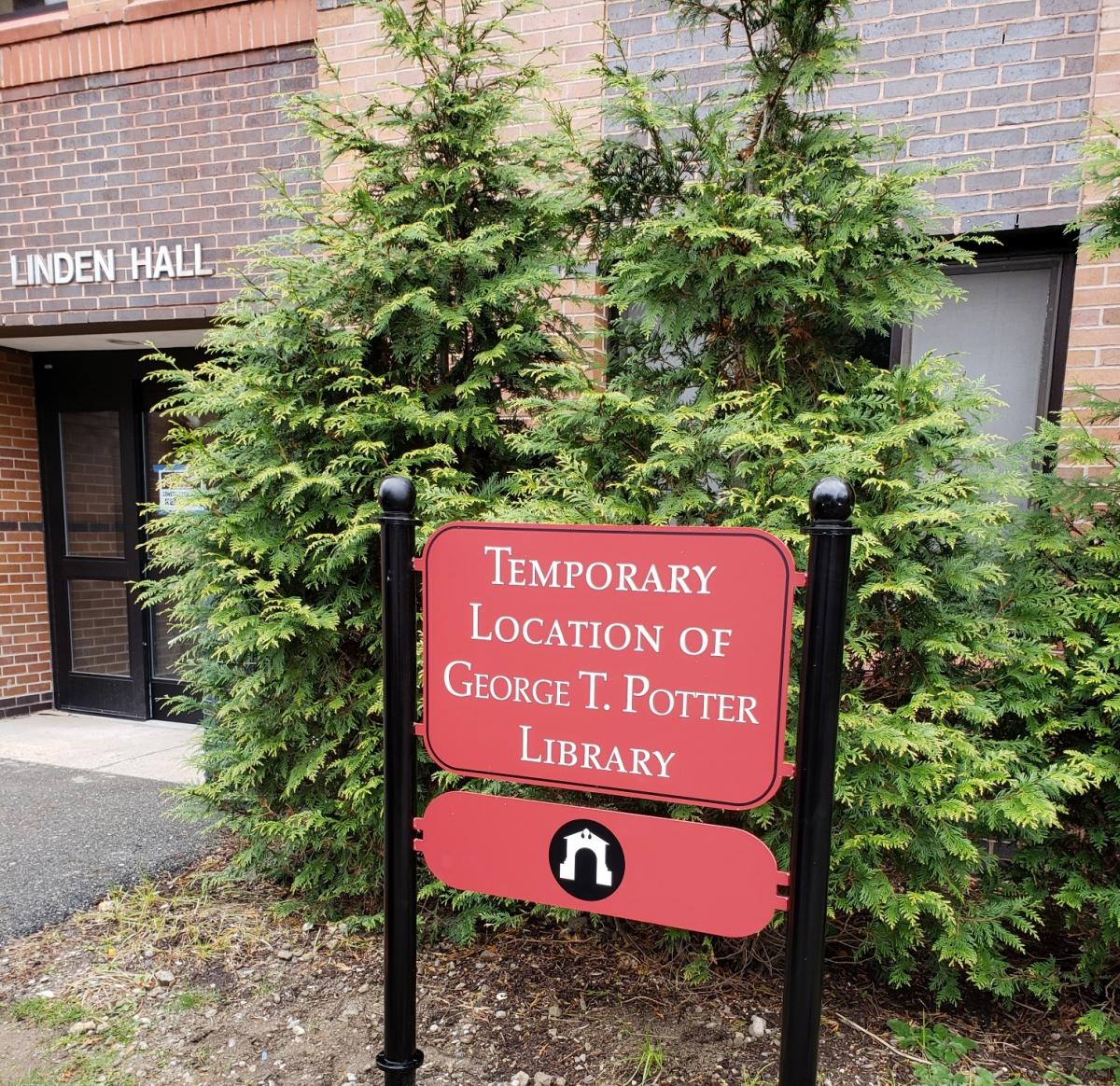

Hilary Westgate is the Reference, Instruction, and Outreach Librarian at Ramapo College of New Jersey. She can be reached at hwestgat@ramapo.edu.
The World of Library Podcasts
by Chelsea Rizzolo and Laura Curry
Libraries are using podcasts to promote materials and services, foster discussion between library professionals and create educational programming for both patrons and staff alike. From recordings of live events and offering book recommendations to stimulating learning in students, podcasts are making a difference in the community.
The United States is home to 90 million monthly podcast listeners (Edison Research, 2019). Libraries can engage these listeners by curating podcast subject guides to display near like-subjects or audiobooks. Starting a library podcast can be done with practically no budget, using free tools such as Canva, iMovie, and Youtube. Start your own personal library listening experience by tuning in to one of these entertaining and educational podcasts.
Chelsea Rizzolo (cbene@rutgers.edu) and Laura Curry (currylaura.e@gmail.com) are students in Dr. Marie Radford's reference course at the School of Communication and Information at Rutgers University.
Editors
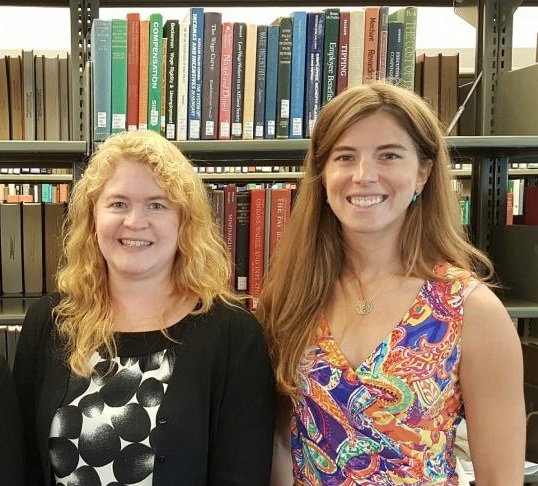 The CUS/ACRL-NJ Newsletter is edited by Joan Dalrymple, Reference and Instruction Librarian at Bergen Community College and Katie Maricic Cohen, Interlibrary Loan, Reference and Instruction Librarian at Ramapo College of New Jersey.
The CUS/ACRL-NJ Newsletter is edited by Joan Dalrymple, Reference and Instruction Librarian at Bergen Community College and Katie Maricic Cohen, Interlibrary Loan, Reference and Instruction Librarian at Ramapo College of New Jersey.
Editors Joan Dalrymple and Katie Cohen pose for a picture during the Summer 2015 Marketing and Communications Committee Meeting at Monmouth University Library.
